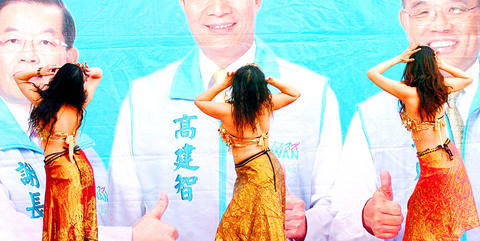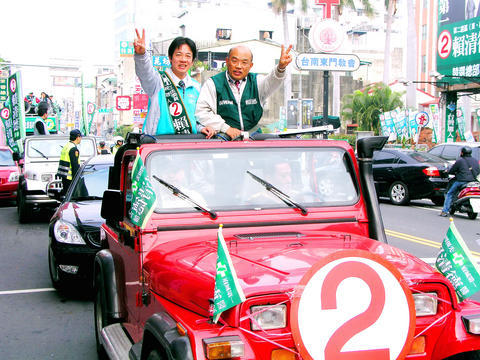With the legislative election battle reaching boiling point with less than a week to go, Democratic Progressive Party (DPP) and Chinese Nationalist Party (KMT) "big guns" engaged in non-stop campaigning around the country yesterday to stump for their prospective legislative candidates.
President Chen Shui-bian (陳水扁), who doubles as DPP chairman, was shaking hands and working the crowd in Taoyuan, Taichung and Miaoli yesterday morning. He then showed up at campaign rallies in Chunghua in the evening.
Other pan-green heavyweights such as DPP presidential candidate Frank Hsieh (謝長廷), his running mate Su Tseng-chang (蘇貞昌) and Vice President Annette Lu (呂秀蓮) also criss-crossed the nation stumping for their party's legislative hopefuls.

PHOTO: CHANG CHIA-MING, TAIPEI TIMES
The pan-blue camp's big guns also spent the last Sunday before the legislative poll on Saturday gearing up support for the KMT's legislative candidates.
Former KMT chairman Lien Chan (連戰), who had not made many public appearances recently, has been on a tight campaign schedule for the past few days. He campaigned yesterday for five candidates in Pingtung and Kaohsiung, constituencies which are considered DPP strongholds.
KMT presidential candidate Ma Ying-jeou (

PHOTO: HUANG PO-LANG, TAIPEI TIMES
Later yesterday, Ma was at a campaign rally in Kaohsiung County while KMT Chairman Wu Poh-hsiung (吳伯雄) was campaigning for a KMT candidate in Chiayi.
Ma said candidates from all around the nation had urged him to campaign for them ahead of the election.
KMT legislative caucus leader Kuo Su-chun (郭素春), an at-large candidate in this year's race, has been attending rallies around the country for fellow KMT candidates and said appearances by Ma have been an asset to their campaigns.
While candidates could judge for themselves how many votes the big names would be worth in their constituencies, Kuo said that from her experience "most KMT candidates believe the charismatic Ma appeals to the voters and they want to capitalize on it."
Lin Tsang-min (林滄敏), an incumbent KMT lawmaker locked in a tight battle in Changhua County, was one of those hoping to benefit from Ma's presence.
He said he has found that his campaign gets a real boost when Ma arrives in the county and stumps on his behalf.
Leveraging support from "Mr or Ms Popular" is becoming one of the most favored campaign tactics in this election. The "populars" are the political stars seen to be capable of livening up campaign platform presentations, fueling election battles and adding votes for the candidates they support.
For the pan-green camp, Government Information Office Minister Shieh Jhy-wey (謝志偉) is considered the most effective "Mr Popular."
DPP Legislator Chuang Suo-hang (
Chuang's comments were echoed by DPP Legislator Sandy Yen (
Other pan-green "populars" include Hsieh, Su and former vice premier Tsai Ing-wen (
Among them, Hsieh's quick wit and humor is quite popular with the candidates, making him the runner-up behind Shieh, Chuang said. President Chen and Kaohsiung Mayor Chen Chu (陳菊) are also popular star campaigners for their high fame and strong speeches, Chuang added.
DPP Legislator Tsai Chi-chang (
But not all candidates favored the political stars as their campaign stumpers.
DPP Legislator Huang Chao-hui (
Three years ago, when Huang ran for legislator, Chen Ling-li promised voters she would devote her full attention to helping her husband and give up her seat on the council should Huang be elected, Huang said.
To this day, Chen Ling-li's grassroots work with the voters during her term as councilor still offers Huang tremendous help, for which he is extremely grateful, he said.
KMT Legislator Shyu Jong-shyoung (徐中雄), who is seeking re-election in Taichung County, also said that he did not need the help of a star campaigner. Of course, he may feel a little less pressure -- the DPP failed to nominate anybody to oppose him.
One KMT candidate, who asked to remain anonymous, said he did not want party heavyweights campaigning by his side because they would manipulate partisan divisions and emphasize the "pan-green" versus "pan-blue" divide.
There were also mixed feelings in the pan-green camp toward having the big names appear on stage.
Under the old system of multi-representative districts, appealing to one's core support base was sufficient to win a seat. In this year's legislative polls, however, candidates are generally engaged in two-horse races where independent voters could decide their fates. They were voters who were likely to be less impressed by the endorsement of party heavyweights engaging in partisan rhetoric.
DPP candidate Huang Wei-cher (黃偉哲), in a tight race against incumbent Non-Partisan Solidarity Union candidate Lee He-shun (李和順) in Tainan County, felt that with the DPP's historical strength in southern Taiwan, President Chen and other party heavyweights should attend more rallies there in order to energize the DPP's core support base.
Huang said he did not worry that the president's speeches might drive away centrist voters because he had plenty of campaigning experience and knew what he should or should not say.
On the other hand, incumbent DPP lawmaker Chiu Chuang-chin (
Chiu said star campaigners were useful in boosting a campaign team's morale, intimidating opponents and giving voters the impression that the candidate had a wide range of supporters, but that they do not necessarily win more votes.
Additional reporting by Ko Shu-ling and Flora Wang

MAKING WAVES: China’s maritime militia could become a nontraditional threat in war, clogging up shipping lanes to prevent US or Japanese intervention, a report said About 1,900 Chinese ships flying flags of convenience and fishing vessels that participated in China’s military exercises around Taiwan last month and in January last year have been listed for monitoring, Coast Guard Administration (CGA) Deputy Director-General Hsieh Ching-chin (謝慶欽) said yesterday. Following amendments to the Commercial Port Act (商港法) and the Law of Ships (船舶法) last month, the CGA can designate possible berthing areas or deny ports of call for vessels suspected of loitering around areas where undersea cables can be accessed, Oceans Affairs Council Minister Kuan Bi-ling (管碧玲) said. The list of suspected ships, originally 300, had risen to about

DAREDEVIL: Honnold said it had always been a dream of his to climb Taipei 101, while a Netflix producer said the skyscraper was ‘a real icon of this country’ US climber Alex Honnold yesterday took on Taiwan’s tallest building, becoming the first person to scale Taipei 101 without a rope, harness or safety net. Hundreds of spectators gathered at the base of the 101-story skyscraper to watch Honnold, 40, embark on his daredevil feat, which was also broadcast live on Netflix. Dressed in a red T-shirt and yellow custom-made climbing shoes, Honnold swiftly moved up the southeast face of the glass and steel building. At one point, he stepped onto a platform midway up to wave down at fans and onlookers who were taking photos. People watching from inside

Japan’s strategic alliance with the US would collapse if Tokyo were to turn away from a conflict in Taiwan, Japanese Prime Minister Sanae Takaichi said yesterday, but distanced herself from previous comments that suggested a possible military response in such an event. Takaichi expressed her latest views on a nationally broadcast TV program late on Monday, where an opposition party leader criticized her for igniting tensions with China with the earlier remarks. Ties between Japan and China have sunk to the worst level in years after Takaichi said in November that a hypothetical Chinese attack on Taiwan could bring about a Japanese

The WHO ignored early COVID-19 warnings from Taiwan, US Deputy Secretary of Health and Human Services Jim O’Neill said on Friday, as part of justification for Washington withdrawing from the global health body. US Secretary of State Marco Rubio on Thursday said that the US was pulling out of the UN agency, as it failed to fulfill its responsibilities during the COVID-19 pandemic. The WHO “ignored early COVID warnings from Taiwan in 2019 by pretending Taiwan did not exist, O’Neill wrote on X on Friday, Taiwan time. “It ignored rigorous science and promoted lockdowns.” The US will “continue international coordination on infectious